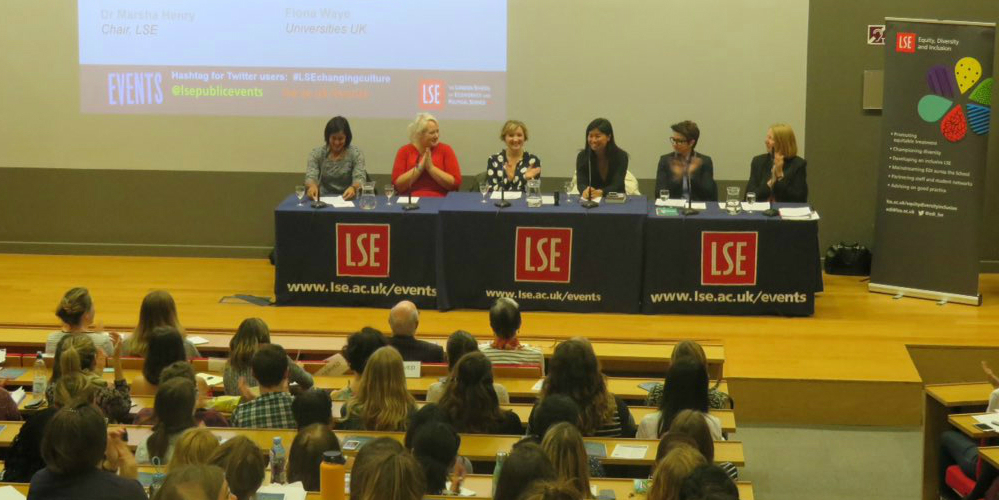On 16 October 2017, LSE Equity, Diversity and Inclusion together with the Department of Gender Studies hosted ‘Report it. Stop it: how can reports of sexual harassment and sexual violence change the culture?‘ As Alex Farley writes, the panel sought to address questions of institutional reforms and responses, focusing particularly on higher education institutions and the need for reform to better tackle the issue of sexual and gender-based violence.
Monday’s panel discussion was a prime example of the discussions regarding sexual and gender-based violence (SGBV) that need to happen within university institutions – and institutions more broadly – if we are to seriously address the issue and continue making strides towards reforms. This article seeks to outline some of the key discussion points and considerations when thinking about institutional reform on this topic.
The panel and several of its members were closely linked to a HEFCE (Higher Education Funding Council for England)-funded project currently underway at LSE, in response to the Universities UK Taskforce’s recommendations on tackling violence against women, harassment and hate crime affecting university students. Such efforts are a positive step in the right direction given the tendency for institutions to be slow to react to allegations of assault and violence within the university system. Universities have been hesitant to provide both proactive and reactive support surrounding the issue, despite the protests of students, who have become increasingly more outspoken in the last few years.
The need for reform
The ‘Hidden marks‘ (2010) statistical survey was an important breakthrough in establishing some understanding of the nature and scale of sexual assault and rape on university campuses. Compiled by the NUS (National Union of Students), Mankind, SurvivorsUK, and Rape Crisis England and Wales, the report suggests that 68 per cent of women attending university have experienced some kind of verbal or non-verbal harassment in and around their institution. This includes groping, flashing and unwanted sexual comments. One in seven university-age women experience serious sexual and physical assault during their time as a student, translating to a national statistic suggesting that 400,000 women are sexually assaulted and 80,000 women are raped each year in the UK.
Whilst this problem appears endemic for women at university, it is by no means limited to women. The same survey reveals that 3 in 20 of the UK male population having been affected by sexual violence. More in-depth studies are needed to move beyond the narrow categories of ‘women’ and ‘men’ in order to understand the extent of differences among students, with greater consideration of gender, racial, sexual and religious identities – although both professionals and institutions appear to be heeding student demands for increased intersectionality.
Challenging the values underlying the system
Panellist Professor Alison Phipps – professor of gender studies at the University of Sussex – focuses on institutional culture and impact in her work on tackling sexual assault and violence. She usefully explains what she terms the ‘institutional airbrushing’ of such acts, a process by which universities seek to minimise or conceal such issues by ‘airbrushing’ either the act or – in the worst case – the perpetrator, from the institution, in the face of marketised education. Given this, Professor Phipps argues that it is crucial to tackle the values underlying the system of higher education or else meaningful reform is at risk of amounting to not much more than rhetoric.
Such notions encourage universities to rise to the challenge and opportunity to address the normative culture surrounding sexual assault and violence on university campuses. Given the complexity of the power dynamics underlying this normative culture, universities need to step up to their role and embrace their capacity to engender positive change. LSE’s new online course – Consent Matters: Boundaries, Respect and Positive Intervention – is an attempt to do so. The course seeks to address the cultural and social complexity surrounding matters of consent, but to also stimulate debate about the positive preventative ways that bystanders might be able to tackle occurrences of sexual assault and violence.
Transforming reform into action
In response to the question of how reporting can change culture, Dr Tiffany Page, co-founder of the 1752 Group, drew attention to the question of what happens after someone does report. The 1752 Group is a UK-based research and lobby organisation working to end staff-to-student sexual misconduct in higher education. Dr Page’s work seems to encourage her to ask the question of how institutions that look supportive on paper actually operate in reality. Such a discussion feeds into a crucial aspect of institutional reform since reform in name needs to go hand-in-hand with appropriate policy, procedures, networks and support services to tackle the issue of sexual assault and violence on campuses effectively.
In raising this point, Dr Page hints at the critical aspect of reform – namely that reporting can surely only help change culture if it is accompanied by sufficient follow-through. The panel touched on several ways that institutions can strive towards sufficient follow-through. These included taking an institution-wide approach to ensure all departments follow the same clearly defined protocol, whilst being sufficiently equipped to both provide and receive support from the broader structure in the process. The need to incorporate and politicise students’ voices in determining sexual violence and harassment policy and evaluating its effectiveness was discussed, whilst the ability of universities to fire and prevent job-hopping remains a contentious but top priority for those working to tackle staff-to-student misconduct.
Furthermore, panellists were united on universities’ need to address issues surrounding SGBV. Given the increased prioritisation of this agenda, universities need to embrace proactive research to understand the scale and complexity of SGBV on their campuses, whilst universities that report no cases should be approached sceptically.
The ‘Report It. Stop It’ panel discussion was a positive example of the ways that institutions need to critically engage with the complex issue of sexual assault and violence. The discussion clearly highlighted the current significance of the issue as well as some of the ways in which an active, intersectional and holistic process of reform can best tackle issues of assault and violence on campuses whilst seeking to overturn the value systems underpinning such culture.
Special thanks to the panellists:
- Jennifer Cirone, Solace Women’s Aid
- Winnie Li (@winniemli) PhD researcher in Media and Communications at the LSE
- Tiffany Page (@t_haismanpage) co-founder of the 1752 Group
- Alison Phipps (@alisonphipps) Professor of Gender Studies, University of Sussex
- Fiona Waye (@FionaCWaye) Senior Policy Lead in Inclusion, Equality and Diversity at Universities UK
- Marsha Henry (@mghacademic) Associate Professor in the Department of Gender Studies and Deputy Director of the Centre for Women, Peace and Security.






